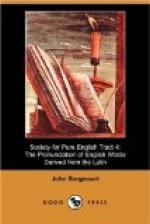BRANGLE
It is defined in the N.E.D. as ‘a brawl, wrangle, squabble’ and marked obsolete. It seems to differ from its numerous synonyms by the suggestion of what we call a muddle: that is an active wrangling which has become inextricably confused.
SURVIVALS IN LANCASHIRE SPEECH
Mr. Ernest Stenhouse sends us notes on Tract II, from which we extract the following:
’Poll (= to cut the hair) is still familiar in Lancashire. Tickle (unstable) is obsolescent but not yet obsolete. As a child I often heard meterly (= moderately): e.g. meterly fausse (? false) = moderately cunning. It may still be in use. Bout (= without = A.S. butan) is commonly heard.
’The words tabulated in Tract II, p. 34, and the following pairs are not homophones in Lancashire: stork, stalk; pattern, patten; because although the r in stork and pattern is not trilled as in Scotland, it is distinctly indicated by a modification of the preceding vowel, somewhat similar to that heard in the [(or]e words (p. 35).
’Homophony may arise from a failure to make distinctions that are recognized in P.S.P. Thus in Lancashire the diphthong sound in flow, snow, bone, coal, those, &c., is very often pronounced as a pure vowel (cf. French eau, mot): hence confusion arises between flow and flaw, sow and saw, coal and call: both these vowel sounds tending to become indistinguishable from the French eau.’
FEASIBLE
Feasible is a good example of a word which appears in danger of being lost through incorrect and ignorant use. It can very well happen that a word which is not quite comfortable may feel its way to a useful place in defiance of etymology; and in such cases it is pedantry to object to its instinctive vagaries. But feasible is a well-set comfortable word which is being ignorantly deprived of its useful definite signification. In the following note Mr. Fowler puts its case clearly, and his quotations, being typically illustrative of the manner in which this sort of mischief comes about, are worthy of attention.
’With those who feel that the use of an ordinary word for an ordinary notion does not do justice to their vocabulary or sufficiently exhibit their cultivation, who in fact prefer the stylish to the working word, feasible is now a prime favourite. Its proper sense is “capable of being done, accomplished, or carried out”. That is, it means the same as possible in one of the latter’s senses, and its true function is to be used instead of possible where that might be ambiguous. A thunderstorm is possible (but not feasible). Irrigation is possible (or, indifferently, feasible). A counter-revolution is possible; i.e., (a) one may for all we know happen, or (b) we can if we choose bring one about; but, if b is the meaning, feasible is better than possible because it cannot properly bear sense a, and therefore obviates ambiguity.




